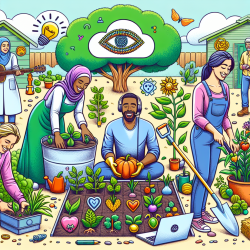Community gardens are more than just plots of land with plants; they are vibrant spaces that foster collaboration, enhance psychological and physiological wellbeing, and build stronger communities. According to the research article "Connecting to nature through community engaged scholarship: Community gardens as sites for collaborative relationships, psychological, and physiological wellbeing," community gardens have numerous benefits that practitioners can harness to improve their skills and client outcomes.
Why Community Gardens?
The study highlights several key benefits of community gardens:
- Enhanced physical activity
- Improved psychological wellbeing
- Increased social engagement
By integrating these elements into your practice, you can offer a more holistic approach to therapy.
How to Implement Community Garden Outcomes
Here are some practical steps to incorporate the benefits of community gardens into your therapy practice:
1. Promote Physical Activity
Encourage clients to participate in gardening activities. This not only boosts physical health but also offers a sense of accomplishment.
2. Foster Psychological Wellbeing
Use gardening as a therapeutic tool to reduce stress and anxiety. The act of nurturing plants can be incredibly calming and meditative.
3. Encourage Social Engagement
Community gardens are social hubs. Encourage clients to interact with others, which can improve their social skills and build a sense of community.
Further Research and Collaboration
The study emphasizes the importance of Community Engaged Scholarship (CES). This approach involves collaborative partnerships between community members and researchers to achieve common goals. Here’s how you can get involved:
- Partner with local community gardens
- Engage in collaborative research projects
- Share your findings with the broader community
By adopting a CES framework, you can contribute to the academic legitimacy of community gardens while enhancing your own practice.
Conclusion
Implementing the outcomes of community garden research can significantly enhance your skills as a practitioner. By promoting physical activity, fostering psychological wellbeing, and encouraging social engagement, you can offer a more comprehensive and effective therapy service. For those interested in diving deeper into the research, consider exploring the original study. To read the original research paper, please follow this link:
Connecting to nature through community engaged scholarship: Community gardens as sites for collaborative relationships, psychological, and physiological wellbeing.










